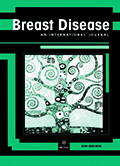Authors: Kashyap, Dharambir | Bhattacharya, Shalmoli | Irinike, Santosh | Khare, Siddhant | Das, Ashim | Singh, Gurpreet | Bal, Amanjit
Article Type:
Research Article
Abstract:
BACKGROUND: Tumour microenvironment (TME) contributes to resistance to anti-cancer drugs through multiple mechanisms including secretion of pro-survival factors by cancer associated fibroblasts (CAFs). In this study, we determined the chemotherapy resistance producing potential of CAFs in molecular subtypes of breast cancer. METHODS: The CAFs were isolated from fresh lumpectomy/mastectomy specimens of different molecular subtypes of breast cancer. The CAFs were cultured and secretome was collected from each breast cancer subtype. Breast cancer cell lines MCF-7, SK-BR3, MDA-MB-231, and MDA-MB-468 were treated with different doses of tamoxifen, trastuzumab, cisplatin, and doxorubicin alone respectively and in combination with secretome of
…CAFs from respective subtypes. MTT assay was done to check cell death after drug treatment. Liquid chromatography–mass spectrometry (LCMS) analysis of CAF secretome was also done. RESULTS: MTT assay showed that anti-cancer drugs alone had growth inhibitory effect on the cancer cells however, presence of CAF secretome reduced the anti-cancer effect of the drugs. Resistant to drugs in the presence of secretome, was determined by increased cell viability i.e., MCF-7, 51.02% to 63.02%; SK-BR-3, 34.22% to 44.88%; MDA-MB-231, 52.59% to 78.63%; and MDA-MB-468, 48.92% to 55.08%. LCMS analysis of the secretome showed the differential abundance of CAFs secreted proteins across breast cancer subtypes. CONCLUSIONS: The treatment of breast cancer cell lines with anti-cancer drugs in combination with secretome isolated from molecular subtype specific CAFs, reduced the cytotoxic effect of the drugs. In addition, LCMS data also highlighted different composition of secreted proteins from different breast cancer associated fibroblasts. Thus, TME has heterogenous population of CAFs across the breast cancer subtypes and in vitro experiments highlight their contribution to chemotherapy resistance which needs further validation.
Show more
Keywords: Breast cancer, tumor microenvironment, cancer associated fibroblast, secretome, therapy resistance
DOI: 10.3233/BD-230011
Citation: Breast Disease,
vol. 43, no. 1, pp. 25-36, 2024





